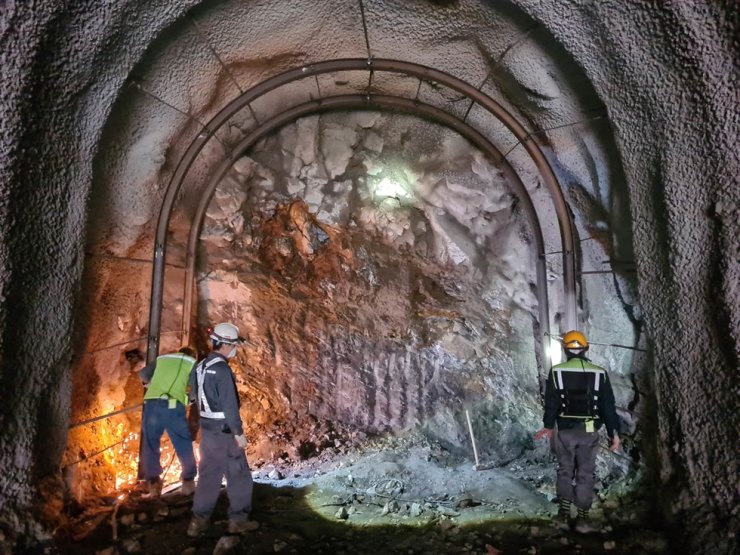
 >
>
>
>
2022.12.09
[INTERVIEW] Almonty set to mine for Korean tungsten to challenge China's dominance

By Park Jae-hyuk, The Korea Times - Korea is still among the countries that rely heavily on tungsten imports from China, despite the local existence of the Sangdong Mine in Yeongwol County, Gangwon Province, which is known to have the world's largest tungsten deposit.
As the mine has remained closed over the past three
decades, the proportion of tungsten oxide coming from China even reached 96.7
percent of all tungsten oxide consumed in Korea, according to the Korea
International Trade Association.
The raw material is used to make gas for semiconductor
processing. Almonty Industries, a Canada-headquartered global mining company
that owns Sangdong Mine, however, is set to diminish Chinese dominance in the
market, by reopening the tungsten mine in the near future.
"Sangdong Mine is now fully funded and construction
is well advanced," Almonty CEO Lewis Black told The Korea Times via email.
"Almonty Korea has been working ahead of mining, including drilling, mine
excavation, and processing plant construction, and is expected to produce 2,500
tons of tungsten every year after the commissioning."
Almonty held a groundbreaking ceremony in May 2021 to
redevelop Sangdong Mine, after acquiring it in September 2015. The company also
raised money from global financial institutions for the project, although it
faced a temporary setback in fundraising.
The mine developer signed a project financing loan
agreement with Germany's KfW-IPEX Bank in 2020, receiving the first drawdown of
$12.8 million in July this year, the second drawdown of $4.1 million in August
and the third drawdown of $9.8 million in September from the bank.
"While developing and proceeding with the project,
of course sometimes we have to face and prepare for unexpected events or risk
lurking in every corner," Black said. "Now our company is moving on
to the detail engineering stage after completing the basic engineering."
He also promised to supply Sangdong Mine's tungsten in the Korean market, once the mine reopens. "Our plan is to downstream the excess concentrate to produce tungsten oxide, which is the product directly consumed in the domestic Korean market," he said. "At full output and by processing additional concentrate from our European operations and scrap, we can provide up to 50 percent of the Korean market's domestic needs."
The CEO was also confident of creating jobs and
revitalizing the town that once had 40,000 residents in its heyday, by hiring
several hundreds of workers for the tungsten mine and a molybdenum mine under
development nearby.
Benefits from US-China trade war
Given that tungsten is used in anodes and cathodes in electric vehicle (EV) batteries, Almonty is also expected to benefit from the U.S. Inflation Reduction Act (IRA), which is partially intended to restrain the growth of China's EV industry. The IRA provides a tax credit to U.S. consumers who purchase EVs that undergo final assembly in North America. All vehicle battery components must be manufactured or assembled in North America, and their critical minerals must be sourced from the U.S. or countries that have free trade agreements with the U.S. According to Almonty, tungsten is designated a critical rare earth by the U.S.' geological authorities. "Since Korean battery companies have a high proportion of use of Chinese minerals, it is difficult to reduce their dependence on Chinese minerals in the short term," Black said. "However, new alternatives can be proposed by providing a strategic partnership through smooth production and establishing a stable supply chain with Sangdong tungsten mine and it can be easily solved."
Concerns over strict industrial accidents law
Despite the optimistic outlook, the Almonty chief executive was concerned about Korea's Serious Accidents Punishment Act (SAPA), which can send a company's CEO to jail if a fatal accident occurs at the company's workplace. "Many foreign companies and investors in Korea, including myself, feel that it is difficult to come up with countermeasures even if they want to abide by the law because the law itself is ambiguous," Black said, criticizing the law for not clearly stipulating whether the management or a manager in the act stands for the CEO, an executive in charge of safety management or the largest shareholder. "It may be considered impossible to comply with the law when it does not specify what kind of law the safety and health-related laws companies should comply with," he added. He urged the Korean government and relevant institutions quickly and clearly to disambiguate the law, so as to help foreign companies to develop countermeasures. "Rather than focusing on the intensity of punishment, the establishment of a safety monitoring system autonomously in specific response manuals and workplaces should be prioritized," he said.
Company at a glance
Almonty Industries is a global mining company specializing in tungsten. It has two operating mines: Los Santos tungsten mine in Spain and Panasqueira tin and tungsten mine in Portugal. Through its wholly-owned Korean subsidiary, Almonty Korea Tungsten, the company also indirectly owns its flagship property, Sangdong tungsten mine, in Gangwon Province.
Source: www.koreatimes.co.kr/www/tech/2022/12/419_340916.html